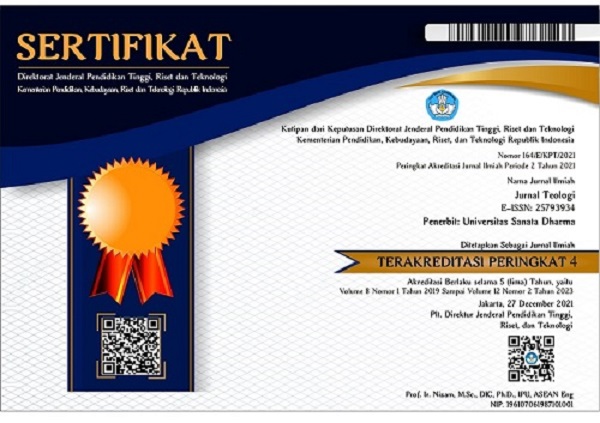DIVINE DEMANDS FOR JUSTICE: AN EXEGETICAL READING OF AMOS 5, 18-27
(1) SSCC
(*) Corresponding Author
Abstract
The book of Amos is one of the prophetic literatures to be read in every context of human life. While reading Amos 5,18-27 we may ask the question: What is the reason for God to hate Israel’s worship and not accepting their offering? This selected text shows a contrasting movement of relationship between God and Israel. God chooses and makes Israel his own, in order that they would be an instrument of his blessing for others. However, the Israelites failed to practice it in their daily life. In this exegetical paper, I would suggest that neglecting justice for the poor in the society provokes God’s anger to hate Israel’s worship and reject their sacrifice. Concerning the wickedness of Israel, Amos declared that even though Israel desires for the day of Yahweh, it is darkness and not light for them (v.18) and because of their sins, God will send them into exile beyond Damascus (v. 27). God hates their attitude but still loves them as his chosen people. The purpose of Amos’s announcement is to change the hearts of ruling class’s behavior and his basic concern on socioeconomic injustices. Amos’s oracles suggest that the officials got rich in dishonesty. The exile is the consequence of the failure of Israel leaders in leading the people to live in divine will. It becomes the moment for Israel to purify themselves before God and being trained for strengthen their good relationship with Yahweh, their God.
Keywords
Full Text:
PDFReferences
Alter, Robert, The Art of Biblical Poetry. New York, NY: Basic Books, 2011.
Carroll, R.M. Daniel, The Book of Amos. Michigan, MI: Wm. B. Eerdmans Publishing, 2020.
Coote, Robert B., Amos among the Prophets: Composition and Theology. Philadelphia: Fortress Press, 1981.
Göran, Eidevall, Amos. A New Translation with Introduction and Commentary. New Haven – London: Yale University Press, 2017.
Hadjiev, Tchavdar S., The Composition and Redaction of the Book of Amos. Berlin: de Gruyter, 2009
Hagedorn, Anselm C., – Mein, Andrew, Aspects of Amos: Exegesis and Interpretation. London - New York, NY: T&T Clark, 2011.
Houston, Walter J., Amos. An Introduction and Study Guide Justice and Violence. London -New York, NY: T&T Clark, 2017.
Jaruzelska, Izabela, Amos and the Officialdom in the Kingdom of Israel. The Socio-Economic Position of the Officials in the Light of the Biblical, the Epigraphic and Archaeological Evidence. Poznań: Wydawnictwo Naukowe UAM, 1998.
Jörg, Jeremias, The Book of Amos, OTL; Louisville, Kentucky: Presbyterian Publishing Corporation, 1998.
King, Andrew M., Eschatology and Social Identity in Amos: Social Identity and the Book of Amos. London: T&T Clark, 2021.
Limburg, James, “Sevenfold Structures in the Book of Amos.” Journal of Biblical Literature 106, no. 2 (1987): 217-222.
McLaughlin, Jhon L., “Is Amos (Still) among the Wise?” Journal of Biblical Literature 133, no. 2 (2014): 281-303.
Paul, Shalom. M., Amos. A commentary on the book of Amos. Minneapolis, MN: Fortress Press, 1991.
Schökel, Alonso Luis, A Manual of Hebrew Poetry. Subsidia Biblica 11. Roma: Editrice Pontificio Istituto Biblico, 2000.
DOI: https://doi.org/10.24071/jt.v12i02.6365
Refbacks
- There are currently no refbacks.

This work is licensed under a Creative Commons Attribution-ShareAlike 4.0 International License.
.jpg)
Indexed and abstracted in:
P-ISSN: 2302 - 5476 (Validity starting Volume 2012-10-05)
E-ISSN: 2579 - 3934 (Validity starting Volume 6, No. 1, Mei 2017)
Jurnal Teologi (Journal of Theology) by Faculty of Theology Sanata Dharma University

This work is licensed under a Creative Commons Attribution-ShareAlike 4.0 International License.














